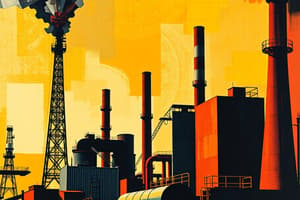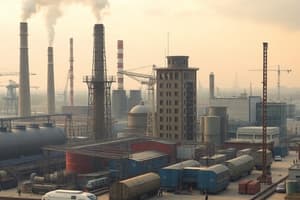Podcast
Questions and Answers
What was a significant outcome of the Industrial Revolution?
What was a significant outcome of the Industrial Revolution?
- Reduction in manufacturing processes
- Decline in trade and commerce
- Growth of factories and cities (correct)
- Expansion of agrarian-based societies
Which invention played a key role in the Industrial Revolution?
Which invention played a key role in the Industrial Revolution?
- Spinning Jenny (correct)
- Light Bulb
- Telegraph
- Printing Press
What was one of the aims of social reforms during the Industrial Revolution?
What was one of the aims of social reforms during the Industrial Revolution?
- Reduction of welfare programs
- Abolishment of labor unions
- Expansion of education and health services (correct)
- Promotion of child labor
How did urbanization contribute to modernization?
How did urbanization contribute to modernization?
Which historical development led to increased interconnectedness of the world?
Which historical development led to increased interconnectedness of the world?
What impact did urbanization have on society during the Industrial Revolution?
What impact did urbanization have on society during the Industrial Revolution?
Which challenge was a direct result of urbanization?
Which challenge was a direct result of urbanization?
What key aspect characterizes globalization in the modern world?
What key aspect characterizes globalization in the modern world?
Which of the following is a consequence of globalization?
Which of the following is a consequence of globalization?
How did social reforms contribute to creating a more equitable society?
How did social reforms contribute to creating a more equitable society?
Flashcards are hidden until you start studying
Study Notes
Exploring Paths to Modernization
The journey towards modernization, a process spanning centuries and continents, has been characterized by significant shifts in economics, societies, urban landscapes, and the interconnectedness of the world. Four notable transitions, each contributing to our current global status, include the Industrial Revolution, social reforms, urbanization, and globalization.
The Industrial Revolution
The Industrial Revolution, which began in the late 18th century in Europe, marked a dramatic shift from agrarian-based societies to industrialized ones. The mechanization of production, fireside inventions such as the steam engine and spinning jenny, and the increasing use of water and steam power led to improved manufacturing processes and a rapid rise in production. This transition fundamentally altered the economic landscape, leading to the growth of factories, cities, and new forms of trade and commerce.
Social Reforms
The social changes that accompanied modernization were equally significant. The Industrial Revolution brought about a new class of workers—the industrial working class—who faced challenging living and working conditions. Answering to the demand for social justice, social reforms aimed to improve the well-being of the lower classes. Among these were the expansion of education and health services, the creation of labor unions, and the introduction of welfare programs. These developments not only improved the lives of the working class but also contributed to the creation of a more equitable and just society.
Urbanization
The Industrial Revolution led to a massive rural to urban migration, as people flocked to cities in search of employment opportunities. This urbanization trend continued throughout the 20th century, resulting in sprawling metropolises and densely populated urban centers. The benefits of urbanization included increased access to jobs, education, and cultural opportunities. However, urbanization also brought about challenges, such as overcrowding, pollution, and the spread of disease.
Globalization
The concept of globalization, referring to the interconnectedness of the world's economies, societies, and cultures, emerged in the 20th century. Globalization has facilitated the free flow of goods, services, capital, information, and people across borders. Enabled by technological advancements, improved transportation, and international agreements, globalization has led to the creation of a global economy, the spread of ideas and cultures, and increased international cooperation.
However, globalization has also brought about challenges, such as income inequality, political instability, and environmental degradation. These challenges require us to consider how best to harness the potential of globalization for the benefit of all people while minimizing its negative impacts.
In conclusion, the paths to modernization encompass a myriad of interconnected changes that have transformed the world. The Industrial Revolution, social reforms, urbanization, and globalization have each played a critical role in shaping the modern world, and our understanding of these transitions is essential for navigating the challenges and opportunities of the future.
Studying That Suits You
Use AI to generate personalized quizzes and flashcards to suit your learning preferences.




